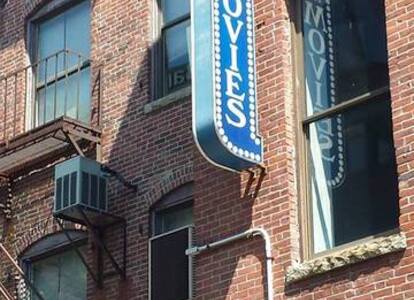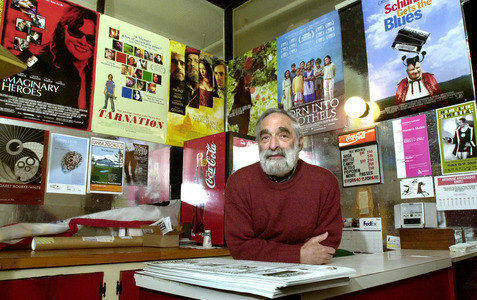The Movies on Exchange Street
BackThe Movies on Exchange Street
10 Exchange Street
Directly across from City Hall is Exchange Street. Travel down the hill to Number 10 on the right.
Not many people know this factoid, but Exchange Street was originally called Fish Street. The name changed when the elegant Merchants’ Exchange was erected on the corner of Middle and Exchange Streets between 1835-1839. Considered to be the finest Greek Revival public building north of Boston, the Merchants’ Exchange was a granite structure with ionic columns and a saucer dome—and a bid to attract the state government back down to Portland from Augusta. When that plan failed, it was converted into the city’s U.S. Custom House (which burned down in 1854). Exchange Street today is a good example of the 19th century brick architecture characteristic of the Old Port.
From 1976 to 2009, 10 Exchange was home to The Movies, an iconic and much-loved art film cinema. For more than three decades, on just one screen, it offered up to 30 showings a week of independent, foreign, and experimental art films and documentaries.
The Movies was originally founded by Lenny and Merle Nelson, plus a couple of financial partners, in 1975. The Nelsons were prominent in Portland’s civic and cultural life; Merle served as a state representative from Portland for 10 years and Lenny served as the president of both the Portland Symphony Orchestra and the Portland Museum of Art during periods of extraordinary growth of each institution. To get started on their new venture, they imported 125 cinema seats from an old Brooklyn theater. [Lenny and Merle’s son Judd Nelson likely got the movie bug from his parents; he grew up in Portland and has since become a major American movie and television star.] After three years, the Nelsons sold the successful business to a senior staff member, who in turn sold it to Steve and Judy Halpert.
The Halperts, who were well-known activists and creatives in the Portland and Jewish cultural scenes, became the longtime proprietors of The Movies on Exchange. Steve taught for more than 50 years at the University of New England and served as chair of the English department. His passion was taking and collecting photographs and mentoring young photographers, and he curated exhibitions well into his 90s. Steve and Judy were on the board of Greater Portland Landmarks and in the 1960s were active in the Maine chapter of the NAACP, helping politicians like Gerald Talbot fight for fair housing.
The Movies predated and prevailed through a number of industry and technological challenges— from the arrival of VHS, DVDs and cable television, to the consolidation of the movie industry, which created a marketplace that favored low-risk blockbusters. In a 2006 interview, Judy Halpert was asked whether their niche “indie” strategy excluded younger audiences who preferred commercial blockbusters. She agreed, saying, “The only time the 15-year-olds came here was for Hoop Dreams. And then the whole audience was a foot taller than usual.”
After more than 30 years under the Halperts’ ownership, The Movies on Exchange closed for good in 2009. The last film screened there was “Casablanca”— the same one the theater opened with in 1976. Even after the brick and mortar cinema ceased to exist, the Halperts continued to show films at the Portland Museum of Art in a series called “Movies at the Museum”. Steve died in 2024.
Today, “indie” film lovers can go to the Maine Jewish Film Festival (MJFF), established in 1998. Maine is one of the smallest states in the nation to boast an independent Jewish film festival. From its humble origins at Beth Ha’Am (Stop W11)—the first year featured six films shown on a TV monitor—the MJFF is now a popular annual film festival with live screenings and cultural events in Portland and across Maine. The MJFF sees itself as continuing to build community in the context of the challenges and opportunities of continuous immigration and reshaping identities. It presents carefully curated, diverse, and sophisticated programs of documentary, narrative, and film shorts that reflect Jewish values and explore the global Jewish experience.

